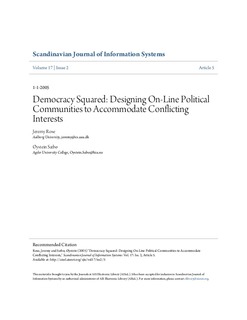| dc.contributor.author | Rose, Jeremy | |
| dc.contributor.author | Sæbø, Øystein | |
| dc.date.accessioned | 2011-09-14T11:46:53Z | |
| dc.date.available | 2011-09-14T11:46:53Z | |
| dc.date.issued | 2005 | |
| dc.identifier.citation | Rose, J., & Sæbø, Ø. (2005). Democracy Squared: Designing On-Line Political Communities to Accommodate Conflicting Interests. Scandinavian Journal of Information Systems, 17(2), 133-168. | en_US |
| dc.identifier.issn | 0905-0167 | |
| dc.identifier.uri | http://hdl.handle.net/11250/136265 | |
| dc.description | Published version of an article published in Scandinavian Journal of Information Systems, 17 (2), 133-168. Also available from the publisher at: http://aisel.aisnet.org/sjis/vol17/iss2/5. | en_US |
| dc.description.abstract | On-line political communities, such as the Norwegian site Demokratitorget (Democracy Square), are often designed according to a set of un-reflected assumptions about the political interests of their potential members. In political science, democracy is not taken as given in this way, but can be represented by different models which characterize different relationships between politicians and the citizens they represent. This paper uses quantitative and qualitative content analysis to analyze the communication mediated by the Democracy Square discussion forum in the first ten months of its life. In the quantitative analysis, citizens’ and politicians’ contributions are analyzed against four different democracy models: Consumer, Demo-Elitist, Neo-Republican and Cyber-Democratic. Whereas politicians’ contributions mainly reflected the Demo-Elitist model, citizens’ contributions tended to reflect the Neo-Republican model. In the qualitative analysis the discourse is analysed as repeating genres—patterns in the communication form which also reflect the conflict of interest between citizens and politicians. Though the analysis gives insight into the nature of the discourse the site supports, little is known about translating this kind of insight into better site design. We match the site’s communication genres with known features of E-democracy sites to generate tentative design improvement possibilities. | en_US |
| dc.language.iso | eng | en_US |
| dc.publisher | AIS Electronic Library | en_US |
| dc.subject | e-democracy, e-community, e-participation, system design, democracy model, genre | |
| dc.title | Democracy Squared: Designing On-Line Political Communities to Accommodate Conflicting Interests | en_US |
| dc.type | Journal article | en_US |
| dc.type | Peer reviewed | en_US |
| dc.subject.nsi | VDP::Social science: 200::Library and information science: 320::Information and communication systems: 321 | en_US |
| dc.source.pagenumber | 133-168 | en_US |
| dc.source.volume | 17 | |
| dc.source.journal | Scandinavian Journal of Information Systems | |
| dc.source.issue | 2 | |
